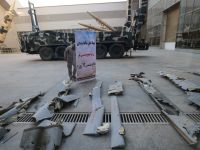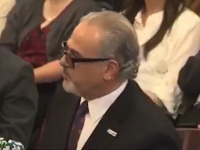December 18 was the opening night of Geek Express in Bachoura, Beirut; a wonderland of electronic marvels. Within its bare stone walls and exposed structural columns, digital interactive LEDs light up when people walk past, a holographic contraption spins illusions, while a 3D printer weaves solid designs and robots play football on a table.
Zeina Abi Assi from the Geek Express team explained that the space was conceived as a place where people of all ages and interests can come to interact and experiment with electronics and technology, as well as buy high-tech products unavailable elsewhere. “We will have a lot of free or very cheap workshops,” she said, “We want this to be a space for everyone, for people from all backgrounds.”
The concept centers on an ethos of bringing to Lebanon the “maker culture,” where people take a hands-on approach to learning about electronics and technology.
One accessory that attracted surprising levels of attention is the Botanicalls, a $159 device that when buried in a plant pot will tweet to tell you when to water it. At least three were ordered on Geek Express’ opening night, according to Assi. The warmly-lit shopfront with its glistening gadgets is housed on the ground floor of a building in the newly launched Beirut Digital District (BDD), which stands on a street alongside plots reduced to mere rubble in one of central Beirut’s most deprived areas. The opulence of the store’s content stands in stark contrast to the surrounding area, and it remains to be seen whether people from the neighboring streets feel that it is accessible to them.
The BDD is a project currently being developed in Bachoura under the auspices of the Ministry of Telecommunications in a bid to transform Lebanon into a digital hub.Two streets away in Khandaq al-Ghamiq, brothers Hassan and Ahmad Khalife run a butchery that their grandfather had a license for since 1936. They know very little about the ambitious project a stone’s throw away.
“Everyone in the neighborhood keeps hearing rumors that land in the area is being bought up quietly, but we don’t know what they want to use it for. Whatever it is, it is intended for another class of people, not for us,” said Hassan. “People are worried it’s going to be like another Solidere,” said his brother “They fear that the people who live here will be pushed out by whatever is coming.”
The BDD is a project currently being developed in Bachoura under the auspices of the Ministry of Telecommunications in a bid to transform Lebanon into a digital hub. Minister of Telecommunications Nicolas Sehnaoui said, “This project will bring a lot to the area and to the country.
This is Lebanon’s last chance to sell something to the world, to have a story. With heavy industry and agriculture near impossible, what we can offer is uniquely creative people, designers. We want the local talent to stay based here. Our digital economy is strong. We have only lacked infrastructure, and we are getting there now.”
Senior advisor to the minister, Karim Kobeissi, the chief designer of the project, explained that the ministry acts as a facilitator, encouraging real estate developers, business incubators, and educational institutions to collaborate on developing cohesive areas where ICT and media companies and digital businesses can cluster together.
The government then licenses the district as a digital zone and provides incentives and infrastructure at discounted rates. The goal is to curb the loss through emigration of innovative and entrepreneurial minds by providing the infrastructure needed to make a Lebanon a base for digital industry, creating business opportunities.
This in turn is expected to encourage large international companies to set up shop here and to tempt expatriates home. The plot in Bachoura is being developed as the pilot project, involving an agreement between ZRE real estate developers and Berytech. According to Kobeissi, the site where the BDD is being developed has not been residential for a long time, having been bought by private landowners after being completely destroyed during the war.
“Up to this time, no one had done anything for the area,” he said. A good number of the residents there do not have legal status, after all some of them have been squatters since the civil war. A good number of the residents there do not have legal status, after all some of them have been squatters since the civil war. Concerning the people who live in the surrounding area, he foresees no conflict of interest arising between the local community and the expected arrival of a digital business district peddling luxury technological goods.
“This area was already next to very high-end, expensive areas; the Central Beirut District, Achrafieh, Clemenceau,” he said. “We are assisting in making a project that will help this area integrate with its surroundings.” Hisham Ashkar, a researcher in urban planning, explained that the effects of the project could in fact be far-reaching for the local community. “A good number of the residents there do not have legal status, after all some of them have been squatters since the civil war. Urban rejuvenation will lead to the implementation of rules and regulations, and since Lebanese laws do not protect the rights of people in housing, but rather put emphasis on the sanctity of private property, the local residents will be eventually forced to relocate.” Kobeissi, however, was of the opinion that the project will not affect the nearby communities adversely. “The area did not have a future. This project is giving this area a future.”
Two young men, who preferred not to be named, are now working as security guards in one of the project’s buildings. “The area used to just be burnt out,” they said, gesturing to the charred skeleton of a building at the end of the street. They said they are from “inside” the neighborhood, a few streets away, and felt that the project was a good thing for the local community. “We have jobs now. Before, there was nothing.”
Kobeissi believes that up to 4,000 jobs within the BDD could be created over the next three to four years, and is adamant that some of these will go to members of the local community. Previous redevelopment projects in Beirut have not necessarily bolstered the livelihoods of the residents in the immediate area.
Ashkar cites the example of the new campus of the Lebanese University in Hadath, adjacent to the impoverished area of Hay al-Sellom. The campus did not serve to rejuvenate the run-down area, and brought no employment to the existing local community. Save for the patronage of two cafes and taxi and bus fares, there has been no economic injection or any other interaction.
Historically, the development of affluent districts inherently pushes those of lower incomes away from the area, as with the arrival of affluence, prices of rent and commodities increase. Ashkar explained that the law in Lebanon gives little or no protection for tenants.
There are two laws pertaining to rent: the new rent law, which is based on a contract renewed every three years that allows landlords to increase rent every three years; and the old rent law, which froze rental prices and makes evicting tenants more complicated, meaning landlords sometimes resort to having the building condemned in order to force them out. Ashkar said that “with the flow of investments and ‘development,’ it is natural that landowners will resort to one of these solutions in order to generate more profit, especially given that there are no regulations to prevent them from doing so, or to protect low income residents." In Ashkar’s words, “Beirut, throughout its urban history, has been a mixture of impoverished and affluent areas, and in most of cases, different social conditions existed in the same neighborhood...In the absence of just social rights or a social welfare state, and with the exasperation of inequalities, tensions will always exist, but are not always visible.”








